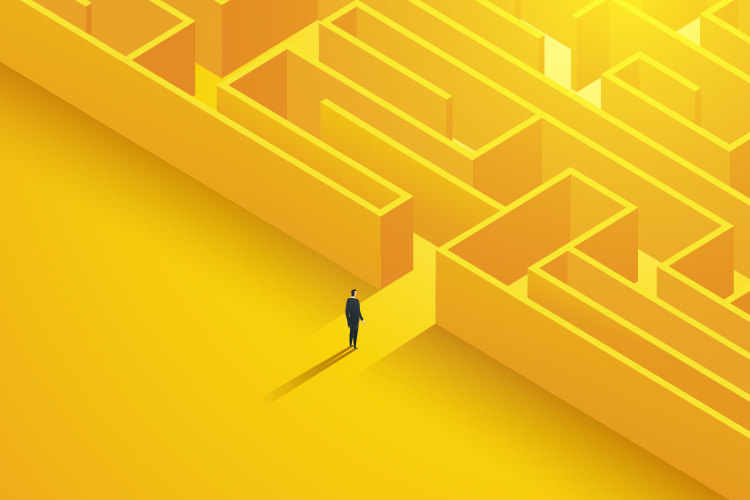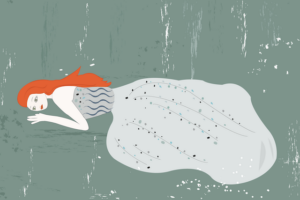Why Uncertainty Is Good for Us

Our brains are hardwired to dislike uncertainty.
Whether or not it was our historical ancestors relying on unpredictable climate circumstances to have sufficient to eat, or our very trendy lives characterised by nonstop change, data overload, and unstable world conditions—that deep sense of not-knowing, to our nervous techniques, can really feel like a risk.
It’s comprehensible that for many of us, uncertainty usually brings up emotions of discomfort and anxiousness. And naturally, unpredictable conditions can typically pose extra than simply emotions of discomfort—that’s what’s on the root of our concern within the first place. It is sensible that we’d wish to get away from them as rapidly as we are able to.
That feeling that we all know what’s occurring and that we’re in management, even when it’s an phantasm, can supply a momentary sense of stability, like we’re grabbing onto a life raft in tough waters.
The result’s that we regularly react by making an attempt to get again to a spot of certainty. Perhaps we dig in our heels a bit bit extra, get into an argument within the remark part, or retreat to social environments the place our already-held concepts are bolstered for us moderately than challenged. All of those perform as self-soothing methods.
However is feeling not sure all the time a detrimental factor?
Right here’s a counter-intuitive fact that current analysis is revealing: a daily dose of uncertainty can really be good for us. As a lot as now we have that carry-over from our ancestors {that a} lack of certainty routinely means “hazard,” we’re additionally wired to have the ability to deal with this state—and to have the ability to use uncertainty as a software for progress.
How Uncertainty Makes Us Stronger & Smarter
In her ebook Unsure: The Knowledge and Surprise of Being Uncertain, journalist Maggie Jackson delves into the concept uncertainty just isn’t a hindrance however a gateway to new potentialities. By reframing our perspective on the unknown, we are able to encourage a mindset that welcomes the richness and potential inherent in unsure conditions.
The extra she appeared on the analysis, the extra Jackson got here to grasp that an excessive amount of certainty isn’t all the time an excellent factor, and that there are essential social, emotional, and psychological advantages to welcoming uncertainty.
Neuroplasticity and Adaptation
Our brains possess the outstanding skill to adapt and rewire in response to new experiences. This adaptability is essential in navigating uncertainty because it permits us to develop resilience, which in flip makes it extra possible that we are going to survive and thrive within the face of unpredictability. We be taught from previous experiences, we discover new choices, and that studying creates new neuropathways that enable us to provide you with much more inventive options to novel challenges.
The Exploration of Prospects
By embracing uncertainty, present analysis suggests, people open themselves as much as a world of potentialities. As an alternative of viewing the unknown as a risk, we are able to enable it to foster a way of curiosity and pleasure about what the longer term could maintain.
Embracing uncertainty could be particularly helpful in terms of working throughout variations: after we’re stubbornly certain of our place, we are usually closed off to different views and decisions. In contrast, after we’re open to saying I don’t know or I can be taught one thing right here, then we create room for recent concepts and options to be launched.
In different phrases, one potential response to uncertainty is concern. One other is curiosity. And curiosity, it seems, is a attribute that individuals who have a better tolerance for stress all are inclined to share.
Constructing Psychological Energy
There are just a few essential psychological advantages that may come up from embracing the unknown, together with elevated cognitive flexibility, heightened creativity, and a higher capability for resilience.
It’s not laborious to see the flipside, too: that there are actual downsides to resisting that liminal place of not-knowing. Analysis signifies that the necessity for an excessive amount of certainty tends to make us brittle and anxious; in distinction, increasing our tolerance for uncertainty retains us nimble. As well as, we get a temper increase from encountering a recent problem and fascinating our curiosity and creativity to provide you with a path ahead.
How Mindfulness Can Unlock the Cognitive Advantages of Uncertainty
As we navigate the complexities of uncertainty, the apply of mindfulness exhibits up as a strong ally.
Mindfulness affords sensible instruments to strengthen resilience and inside calm, even within the face of what we don’t know and may’t management. Maggie Jackson’s work affords insights round how conscious practices may also help us face uncertainty with extra braveness and openness.
Current-Second Consciousness
Our discomfort with not-knowing comes after we attempt to anchor ourselves sooner or later: What’s going to occur? How can I be sure that all the pieces works out? What if it doesn’t? Mindfulness encourages us to anchor ourselves within the current second, fostering a way of groundedness and readability, even within the midst of uncertainty.
Nonjudgmental Acceptance
Uncertainty usually triggers a cascade of troubling ideas and feelings: concern, doubt, anger, anxiousness, stress. Mindfulness invitations us to watch these ideas and feelings with nonjudgmental acceptance, permitting them to come up and go with out clinging or aversion. If we cling to emphasize, we’re going to make decisions primarily based on resistance to that stress. Alternatively, if we enable that stress to only be there, with out making an attempt to “repair” it, then our curiosity or marvel can emerge, and now we have a greater likelihood of creating clear-headed decisions.
Cultivating Resilience
Mindfulness practices have been proven to boost resilience—the flexibility to adapt to difficult life experiences. By growing a conscious strategy to uncertainty, we are able to construct our resilience muscle tissues, strengthening our capability to reply, cope, and develop amidst life’s unknowns.
Making Peace With the Unresolved
Finally, mindfulness invitations us to embrace uncertainty as an integral a part of the human journey, even—or maybe particularly—when there isn’t a prepared decision. Generally, there aren’t obvious solutions, no less than not for an extended whereas. Fairly often, we don’t have management over outcomes. Even with all our creativity and curiosity, typically we can’t determine it out, and all that’s left is to make peace with what’s unresolved. This may embody transferring by way of a grieving course of, selecting forgiveness when it’s very tough, or providing ourselves heaps of self-compassion. In conditions like these, conscious practices develop into an much more highly effective path of progress, discovery, and self-transformation.
Studying to make pals with the unsettling human expertise of uncertainty can take time. As with all difficult feelings, half of the work is simply studying to remain in the identical room when that prickly sense of not-knowing arises, to let it simply be there with out denying, distracting, distancing, or numbing ourselves to it.
Mindfulness affords a sensible approach to interact with uncertainty, to open ourselves to it as a instructor, and to combine the knowledge it affords.






